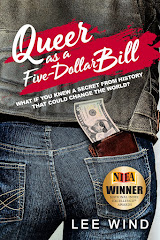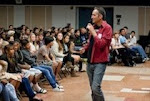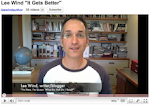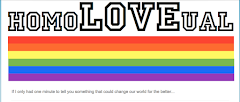
I'm incredibly honored and stoked to interview Paul Fleischman, who will be giving the Monday Aug 2, 2010 Keynote speech, "Surviving The Novel," at the upcoming
SCBWI (Society of Children's Books Writers and Illustrators) Summer Conference in Los Angeles, CA.Paul won the Newbery Medal in 1989 for "Joyful Noise: Poems for Two Voices" - a book of lyrical poems about insects that he made both musical and a shared reading experience - bringing the magic of reading a picture book with a child to two readers of any age. It's playful and ingenious, and like so much of Paul's work, redefines the box - while still being outside it.

He's written picture books (like "Weslandia,"

"Time Train," "Glass Slipper, Gold Sandal," and "The Animal Hedge," - which totally made me tear up!,
plays (like "Zap")

middle grade and Young Adult novels (like "The Half-A-Moon Inn," "Breakout," "Whirligig,")

and Non-Fiction that like everything else, blew my socks off (Like "Cannibal in the Mirror" and "Dateline: Troy")

Let's jump right in!
Lee: Hi Paul, thanks so much for agreeing to this interview!
Your books always seem to start with an incredibly cool concept - "Dateline: Troy" matched a re-telling of the Trojan War with headlines from the last 30 years to show that while it seems like ancient history/myth, every part of that story could be real. (Like the King and Queen consulting a dream interpreter after the Queen's nightmare - matched with a news article revealing that President Reagan and his wife Nancy consulted astrologers while they were in the White House.)
Is that how your writing a new project always starts?
Paul: Some start with form--such as poems for two readers. Some start with content--like the newspaper story about an all-day freeway traffic jam that led to Breakout. I need something exciting that will generate the desire and energy to get me over the hundred hurdles that await. Working in new forms brings me that sort of excitement. The idea is just the beginning, of course. As my father used to say, ideas are everywhere--it's what you do with them that counts.Lee: Your novel "Whirligig" explores the sometimes unexpected consequences of our actions. The book starts off with 16 year old Brent, obsessed with trying to be popular, making a series of choices that costs another teenager her life - and then the restitution the victim's mother asks of him. The wind sculptures he makes in honor of the girl he killed transform other lives, in ways he doesn't know.
There's a power in writing that many people are scared of. From funny moments like Steph and Alexandra talking about cooking Pepsi down to a syrup to eat on ice cream to under age teens drinking and smoking pot at the opening chapter's party - authors write things that other adults fear young readers will try for themselves.
How do you, as an author, insulate yourself from that pressure/noise and honestly write the story that needs to be told?
Paul: This issue has faded. There no longer seems to be anything that can't be included in YA books. Instead of angry adults outraged by your material, the more common problem is marketing departments rejecting manuscripts for lack of profit potential. Dateline: Troy, which you just mentioned, was turned down by dozens of publishers for this reason.Lee: While gathering books from the library's shelves of Paul Fleischman titles, I came upon two different versions of your picture book, "The Birthday Tree." One illustrated by Marcia Sewall (Harper & Row, 1979) the other by Barry Root (Candlewick, 2008). How did that come about, and what was it like to see two completely different visual interpretations of your words?
Paul: Writing is one of those rare jobs in which you get paid more than once for the same labor. If you're long-lived, you might have your out-of-print picture books bought and reissued with new art, as Candlewick has done with several of mine. The Birthday Tree was my first book and I love Marcia Sewall's pencil illustrations--a medium all but vanished these days. Though that book has a special place in my heart, I love the warmth and palette of Barry Root's work as well.Lee: You're scheduled to talk about "Surviving the Novel." Why that topic?
Paul: I noticed that picture book writers and poets have a fear of novels as something unattainable. This talk is especially for them. It comes from personal experience, as I felt the same way when I set out to write a novel for adults a few years ago and didn't think I could write at that length. I prayed I'd somehow get to page 200. I ended up on page 498. I'll share what I learned about longer forms.Lee: There's a strong theme of respecting others in many of your books (I'm thinking of "Cannibal in the Mirror", which paired quotes from explorers deriding the "primitive" cultures they were seeing throughout history with modern day photos of we Americans doing pretty much the exact same thing. (Like a 1887 quote from an explorer of the Solomon Islands talking about the "superstitious practice" of affixing a small wooden figure to the stem of a canoe paired with a photo of the jaguar hood ornament from a car dealership in Darien Connecticut.) It's really thought-provoking.
Also, in "Glass Slipper, Gold Sandal: A Worldwide Cinderella" you re-tell the Cinderella story taking us around the world and helping us see just how universal our emotions (and our stories) are.
You make incorporating theme seem effortless! Sometimes writers who feel passionate about a theme go too far and their work starts to feel preachy - any advice to the rest of us on how to avoid this?
Paul: Keep your allegiance to your characters, not your theme. The minute your theme starts driving the book, the story will start feeling contrived--because it will be.Lee: Ohh - that's so wise, I need to copy it and post it above my computer! You've written works of such breadth and variety - do you feel that it's the freedom of being a Newbery Medal winner, or is it a freedom all writers have?
Paul: I wrote in different genres from the beginning, which kept publishers and readers from pegging me. This was good, because I thrive on variety and dislike repeating myself or anyone else. The downside--that I don't have a clear brand and audience to match--doesn't bother me. The freedom to follow my own interests is far more important.Lee: Last Question! It's going to be Summertime in Los Angeles. Four Days of sunning ourselves in ideas and inspiration and the world of Children's Literature. Which libation to quench your thirst? Ice Tea, or Lemonade?
Paul: Lemonade. Or Wyder's pear cider...Lee: Thank you so much, Paul! I can't wait to hear your keynote at the conference!
Check out
Paul's website and come see him share his wisdom at the SCBWI Summer Conference in Los Angeles, July 30 - Aug 2, 2010!
You can still register for the conference here!Namaste,
Lee


960.jpg)























































